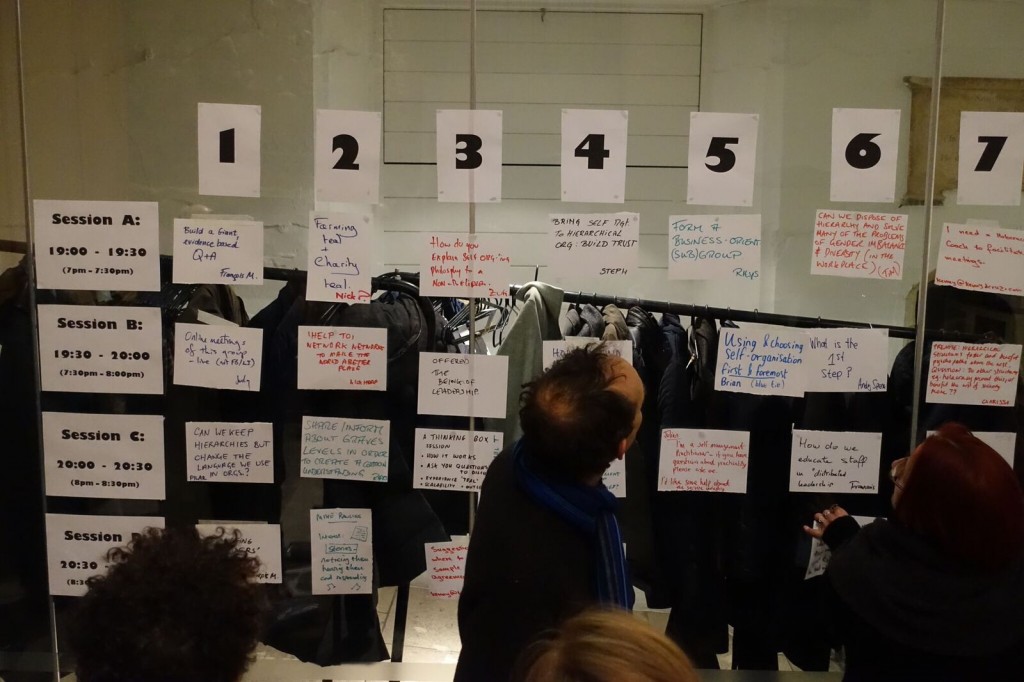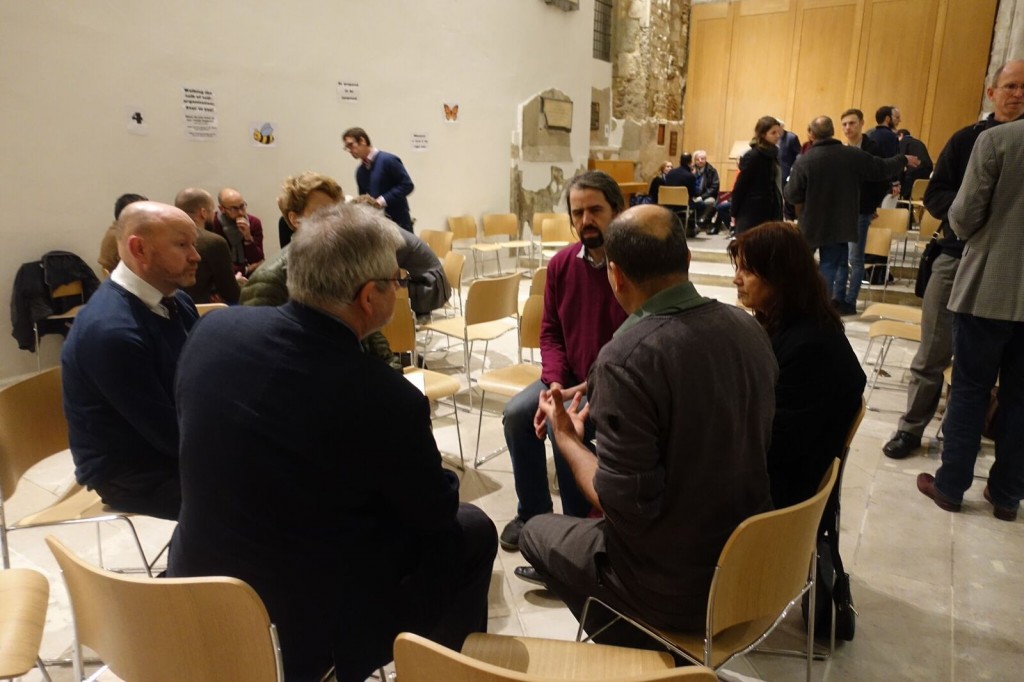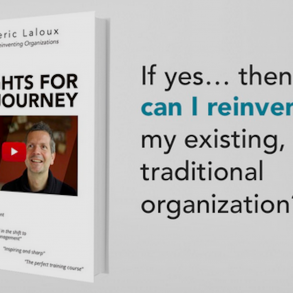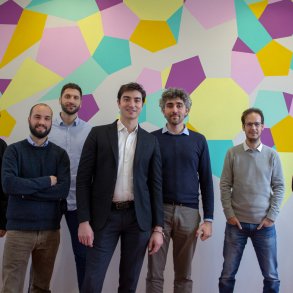At the last RSA Reinventing Work Network event, someone remarked that the event itself hadn’t been particularly representative of self management. Challenge accepted. This time, Judy Rees handed over to Martin Grimshaw and François Knuchel of Caterfly to facilitate an event using Open Space Technology. The theme? ‘Walking the talk of self management – over to you!’
So if traffic light junctions produce passive motorists and roundabout junctions produce self-managing motorists, St Ethelburga’s Centre in Bishopsgate had been turned into a roundabout junction for us. We arrived to a circle of chairs and the rules of Open Space Technology plastered around the room. The agenda was co-created with minimal instructions and everyone was free to choose which session they joined.
Session 1
I joined a session on ‘how do we explain self-management to non-believers in a way that they can understand?’ The discussion quickly led to a debate about whether or not it was right to try to ‘convert’ non-believers. Actually, I think Zufi (who suggested the topic) was less interested in converting and more interested in how to explain self-management to interested people in a way that isn’t fanatical, complex or mystical.
I decided to exercise the Open Space ‘law of two feet’ and wandered around some of the other groups. I eventually landed in a conversation about the need for a guide to becoming ‘teal’ (the next stage in organisational consciousness as outlined in Frederic Laloux’s book Reinventing Organisations). Lots of people talk about transitioning from hierarchy to something else, but what about new companies who want to embody a new way of organising from the start?
Some members of the group had already started projects such as a book on Human Organising or teal for startups which was exciting. And then the bell rang. It was time to move on.
Session 2
This time I joined a group of women in a quieter breakout space to discuss whether hierarchy produced psychopaths and if other more self-managed systems rejected them.
I think we came to a sort of conclusion that psychopaths (or sociopaths) will always exist but hierarchy as a system seems to protect (and even reward) them. In a self-managed system, they might still survive but they would at least be more visible so the group may be more likely to call them out on their negative behaviours.
Theresa at one point said, “we need to neutralise them,” and then quickly added, “gently! Not kill them!”
Session 3
This session was led by Julian Wilson whose company Matt Black Systems successfully transitioned from a traditional hierarchy to a self-managed structure. One participant asked, “how did you get buy-in from the middle managers?”
Julian explained that there was no need for managers in the new self-managing model as they could automate administration and distribute the remaining responsibilities across the ‘direct value adders’. Managers were offered non-managerial roles at the same pay but they weren’t able to adapt to the loss in status and eventually left. Not surprising, then, that managers around the world are resisting the move to more autonomous organisational structures – it’s a direct threat to their existence!
Finally, Julian explained how he implemented the processes and structures required for the new self-managed system. He and business partner Andrew wanted to make a change that wouldn’t cost the business but that also wouldn’t affect the 3 Ms for individuals: Me, my Money, or my Mates. They decided to start by banning overtime but made sure they paid each person what they would have been paid with overtime as an unencumbered bonus.
In the first month after the overtime ban, nothing changed. But in the second month, one project manager realised he could adjust his work hours to allow time for his evening and weekend hobbies and still get his work done. Suddenly, the others became curious. By the end of the sixth month, only one person was still working overtime hours. Productivity leapt up by 20%.
Chuck Blakeman, author of Why Employees Are Always a Bad Idea, calls this moving from a time-based culture (where people are paid for their time) to a results-based culture (people are paid for their contribution).
It occurred to me that giving people back freedom over their time is like a keystone habit that creates a chain reaction of empowerment and accountability in other aspects of people’s work.
Session 4
In true Open Space fashion, I didn’t join a fourth group and instead continued chatting to Julian. We talked about Haier, a Chinese consumer electronics company that has operated in a self-managed fashion for many years and with great success.
And then it was time to round off the event. We had walked the talk of self-management for an evening – how had it felt?
“Better.” “I wasn’t angry this time!” “A bit rushed…I wanted longer in our conversations.” “Like walking in a hall of mirrors. I had no idea where I was, but I was having a good time!” “No one died!” (My favourite) “The conversation not on the agenda was the one I needed to have.” “The best way to learn was to lead a discussion.” “As the facilitator I felt like I had to keep one eye and ear open because I felt responsible. But actually, everyone was responsible.”
As Francois pointed out at the start, the word conversation comes from the Latin ‘con’ which means ‘together’, and ‘versare’ which means ‘to turn’ or ‘to dance’. So we danced together, and had some very insightful conversations. And hopefully this will generate new connections and actions, too. Already there is an online community event planned and who knows what else may emerge…
The next RSA Reinventing Work Network event is on the 1st of March at Makers Academy.







Wonderful. I’m curious about the design choice of four 30 minute session times. In an evening or half day OST I lean toward minimum 45 minute sessions, as shorter than this can feel rushed. Well done all!